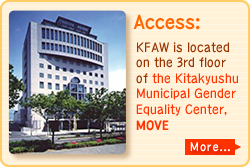
Contents
I to T (Internet to Things Every object is connected to the Internet.) In recent years, digital sex crimes such as the n-ban room incident have become a major problem in South Korea, and a report on victim protection was given from Incheon, South Korea, a sister city of Kitakyushu City.
From Bhutan, two government officials and an CSO, who came to Japan in May-June this year for JICA training, spoke about gender issues in relation to their daily work.
- Victim Support for Digital Sexual Crimes in Korea, focusing on the Incheon Digital Sexual Crimes Prevention Center’s One-Stop Integrated Support.
-Kim Han Sol (IFWF(Inchon Foundation for Women and Family)) - Self-transformation and its impact on populace through the lens of GCFP
— Sonam Dorji (Sr. Legal Officer Gelephu Thromde Administration) - My Daily Work
-Yeshey Lam ( Deputy Chief counselor National Commission for Women and Children (NCWC)) - Women’s issues in Bhutan
-lhaden wangmo ( CSO RENEW Project Manager)
CSO (Civil Society Organization)
RENEW(Respect, Educate, Nuture, Enpower Women)
Victim Support for Digital Sexual Crimes in Korea, focusing on the Incheon Digital Sexual Crimes Prevention Center’s One-Stop Integrated Support.
– Kim Han Sol
IFWF(Inchon Foundation for Women and Family)
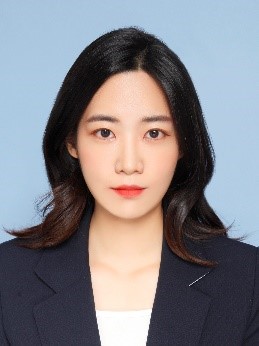
【Incheon Foundation for Women and Family】
Incheon Foundation for Women and Family aims to realize gender equality in Incheon and was established in 2013 through the merger of the Incheon
Development Research Women’s Policy Centre and the Incheon Women’s Culture Centre.
For the past 10 years, the foundation has conducted research on women and family policy in line with regional characteristics and women’s social
education. It also spearheads employment promotion projects. Since 2021, the Foundation has also been operating the Gender Equality Museum DADARUM and the Digital Sexual Crime Prevention and Response Centre, as well as the Children’s Love & Dreams Square Operational Support Organization to promote the culture of gender equality, in order to get closer to citizens.
In the future, the foundation will strengthen its cooperation with the Incheon City Government and incorporate the voices of Incheon women into its policies and projects. By acting as a hub for communication with the community, we strive to create an Incheon that is a harmonious blend of work, life, and rest.
In Korea, public awareness of digital sexual crimes has increased since the “Sora.net case” and continues to rise due to repeated occurrences of these crimes on different platforms, such as web hard cartels, dark web operations, and the Nth Room case. The severity of digital sexual crimes targeting children and adolescents was brought to the forefront by the Nth Room case, which shook Korean society and led to the revision of digital sexual crime-related laws (commonly known as the “Nth Room Prevention Act”). The legal basis for punishing perpetrators was strengthened by adding and supplementing the “Act on Special Cases Concerning The Punishment Of Sexual Crimes” and the ” Act on Protection of Children and Juveniles against Sexual Abuse,” thereby establishing a legal framework for protecting victims.*1
Digital sexual crimes punishable under the law are broadly categorized as illegal filming, non-consensual distribution, distribution with threats, possession, purchase, storage, distribution, and consumption of illegal filming materials for profit, production and distribution of false videos, production of grooming and sexual exploitation materials targeting children and adolescents, and sexual harassment in cyberspace (Kim Hee-jung and Park Kwang-min, 2020).*2*3 However, despite these legal provisions, there are still types of crimes that remain unpunishable under the law and continue to occur. The Incheon Digital Sexual Crimes Prevention Center provides comprehensive support to victims, which is not limited to the legally defined types of digital sexual crimes.
The Center’s “one-stop integrated support” program comprises various services, including counseling support, deletion support, case support, legal support, medical expense support, and healing program support. During the counseling support process, the Center addresses the psychological difficulties experienced by victims through phone or face-to-face counseling, identifies the victim’s needs, and develops a suitable support plan. The deletion support service monitors the distribution of filmed materials without the victim’s consent, such as videos that were filmed and distributed without consent on domestic or foreign platforms. If the video has been distributed, in case it is used in the investigation, they document the distribution and request that it be removed as soon as possible. We are also requesting that the site be blocked so that other users cannot access it.
The case support process provided by the Incheon Digital Sexual Crimes Prevention Center ensures that victims are not excluded from information during police and prosecution investigations and supports them in responding appropriately at each stage. To ensure defense rights during criminal procedures, defendants are provided with information on the progress of the case and controversial issues. However, given the lengthy criminal process that lasts for more than a year, victims may experience exclusion from information such as the status of the perpetrator’s punishment, which can exacerbate their anxiety. Additionally, during the trial process, defendants may deny the abusive acts, and victims may be required to attend as witnesses during the dispute, making continuous case support necessary. The Center collaborates with lawyers in charge throughout the entire criminal procedure to provide professional legal support and ensure that victims are protected and able to find their rights.
Finally, the Center’s key support is victim recovery. Helping victims overcome physical trauma and psychological difficulties is crucial for their return to everyday life. Thus, the Center provides direct support for victims’ physical and mental treatment expenses and operates customized healing programs for digital sexual crime victims to aid their return to their daily lives. Given that digital sexual crimes often involve underage victims, the Center operates programs consisting of media such as art and sand play, considering their specific needs.*4
In addition, the Incheon Digital Sexual Crimes Prevention Center recognizes that the structural essence of digital sexual crimes is gender-based violence that combines misogyny, child and adolescent sexual abuse, and sexual exploitation industries (Kim, Han-gyun, 2020).*5 Thus, the Center strives to improve awareness by promoting the understanding that the essence of digital sexual crimes is a problem of the social structure that commodifies women’s bodies. Moreover, the Center conducts activities to prevent digital sexual crimes, such as sharing the main types and methods of occurrence that can expose teenagers to the risk of digital sexual crimes and providing education on how to use the digital space safely. The Center will continue its prevention and response activities reflecting the voices of victims to eradicate digital sexual crimes.
Since digital sexual crimes have no boundaries between regions and countries, the problem will continue to occur without spatial constraints as digital devices become widespread and access to the online environment becomes universal. Therefore, we strongly feel the necessity of international alliance and hope for a national alliance between Korea and Japan to eradicate digital sexual crimes.
*1 “A Bill to Partially Amend the Special Act on the Punishment of Sexual Violence Crimes,” 377th National Assembly, No. 2024883 (Apr. 29, 2020).
*2 Kim, Hee-Jung and Park, Kwang-Min. (2020). The Concept, Types, and Actuality of Digital Sexual Crimes and Ways to Improve. Sungkyunkwan Law Review, 32(4), 237-276.
*3 Ministry of Justice, “Types of Digital Sex Crimes,” Living Law Information, https://easylaw.go.kr/CSP/CnpClsMain.laf?csmSeq=1594&ccfNo=1&cciNo=1&cnpClsNo=1 (last visited May 7, 2023).
*4 For more information on the center’s support, see the video “A Day in the Life of Daon” (https://youtu.be/whKJBoj6ExQ).
*5 Kim, Han-gyun. (2020). Blocking and dealing with digital sex crimes – Criminalization of technology-mediated gender-based violence. Justice, 178, 369-392.
Self-Transformation and its impact on populace through the lens of GCFP
– Sonam Dorji
Sr. Legal Officer Gelephu Thromde Administration
【Introduction】
By profession, I am Sr. Legal Officer in the Royal Government of Bhutan currently serving under the Gelephu Thromde (Municipality). It has been almost two years since I have been assigned to be the GCFP (Gender and Child Focal Point) for the Thromde. As a focal point, I had the privilege and opportunity to attend various workshops and training on violence against women and children in the country. It has been an overwhelming experience for me to understand various issues on women and children through such programs and experiences shared by fellow participants, especially the CBSS (Community Based Support System) volunteers. Further, I had the privilege to attend country focused training on Protection and Care of Women and Children in Japan for three weeks. Hence, with the objective of serving the vulnerable sections of the society through my knowledge and experience gained, I also joined CBSS as a volunteer.
【Roles of GCFP】
As GCFP, I assume the following multifaceted responsibilities as:
a. Protection Officer: Conduct assessments on survivors of domestic violence and child abuse.
b. Probation Officer: deal with the diversion of children in conflict with laws.
c. Member secretary to TWCC (Thromde Women and Children Committee): Initiate any critical issues and challenges affecting women and children.
d. Liaison: Consult with other service providers, such as NCWC (National Commission for Women and Children) PEMA (Pema Centre Pema Centre Secretariat; the Centre was established upon the Royal Command of Her Majesty the Queen of Bhutan to spearhead Bhutan’s national response to mental health) Secretariat, Royal Bhutan Police, Local Government Authorities and RENEW/ CBSS Volunteers.
【Self-transformation】
Self-transformation refers to the process of making significant and lasting changes in oneself, often with a goal of personal growth, self-improvement, or achieving a desired state of being. However, I would like to briefly state what self-transformation means to me, in terms of the role that I play as a GCFP. There is a feeling of oneness and inter-linkage with the women and children that requires protection and care. I have developed a non-judgmental approach and reckon the challenges of women and children as an essential part of building a healthy community. I have developed a passion to endure under trying circumstances and honor to be a part of the solution. I never consider the role of GCFP as an additional mandate, rather I take it as an opportunity to serve the community with empathy. Based on the merit and the exigencies, I even make myself available during the weekend as well.
【Doing things differently】
While all would agree that there are relevant laws and policies to address the challenges faced by women and children in Bhutan, there are no provisions of law that are custom fitted for every challenge. Hence, I take the common ground approach to address the issues, as the laws are meant to rescue and provide full support to the survivors of DV, children under difficult circumstances, and children in conflicts with laws. In doing so, I take calculated risks to provide services without fundamentally contravening the provisions of laws. Otherwise, the delayed assistance and support will further damage the survivors’ psychological well-being.
【Supplementing Socio-psychological supports】
With the advancement of science of mind and wonderful services rendered by the counselors, a handful of survivors and perpetrators, desirous of healing from trauma seek my consensus building mechanism. Thus, I offer to mediate the issues to resolve the conflict amicably to prevent bitterness amongst the intimate partners. The art of active listening and acknowledging the concerns raised by both the survivor and the perpetrators is taken into consideration with due diligence to reach a consensus between the parties.
【Agent of change】
Peace in the community or family is an integral part of a just and harmonious society. Having trained on and understood the issues of women and children, and accepting the frailty of human behaviors, it has become my responsibility to facilitate and drive positive changes by influencing the attitudes, behaviors, and processes of perpetrators. I need to inspire and motivate people to embrace unity and harmony. I am willing to explore alternative solutions and think creatively to address problems. Building trust and credibility of the services that I provide will make people understand the perspectives and concerns of those affected by one’s behavior. It is imperative to demonstrate empathy and actively work to address the emotional aspects of the survivors as well as the perpetrators.
Effective communication is essential for the change to happen. Being change agent also involves stepping out of comfort zones and being open to new experiences.
【Ground reality】
In addressing the issues of women and children, however, trifle it may appear prima facie, one may come across the complexity of the issues after comprehensive assessment of the case. Hence, engaging with a support system, such as friends, family, mentors, or professionals provides guidance. It often requires collaboration and cooperation too. Hence, I keep healthy interpersonal relationships with relevant service providers and stakeholders to address the issues in a comprehensive manner.
【Walking extra miles with Indigenous values】
There is no dearth of inspiration drawn from the international best practices enshrined in laws, because Bhutan had ratified two notable Conventions; CEDAW (Convention on Elimination of all forms of Discrimination against Women and Convention on Rights of Child), However, those best practices so profound in Western settings which we adhere to may not work in our country due to differences in socio-cultural values. Hence, with the support of District and Thromde, we are exploring to include representatives of Monastic Body to be an active member to provide their services to prevent, protect, and care for violence against women and children.
【Conclusion】
Given the dynamic nature of the community and having a direct impact on relationships and vice-versa, the challenges faced by women and children will become more complicated in the future. However, a resolute individual who is willing to go beyond the mandates of his or her profession will make a major impact on the vulnerable sections of the populace.
(REMARK)
GCFP (Gender and Children Focal Point)
CBSS (Community Based Support System)
TWCC (Thromde Women and Children Committee)
PEMA (PEMA Centre The Centre was established upon the Royal Command of Her Majesty the Queen of Bhutan to spearhead Bhutan’s national response to mental health)
RENEW (CSO, Respect Educate, Nurture, Empower Women)
NCWC (National Commission for Women and Children)
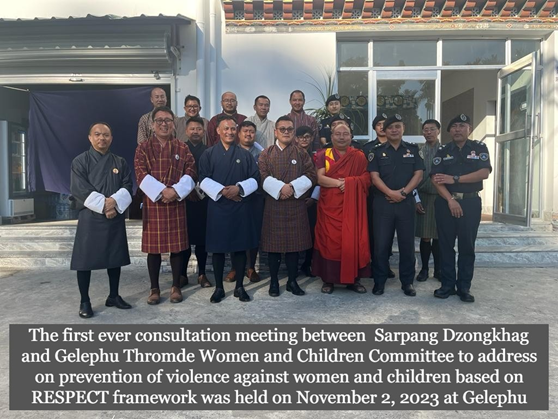
My Daily Work
– Yeshey Lham
Deputy Chief counselor National Commission for Women and Children (NCWC)
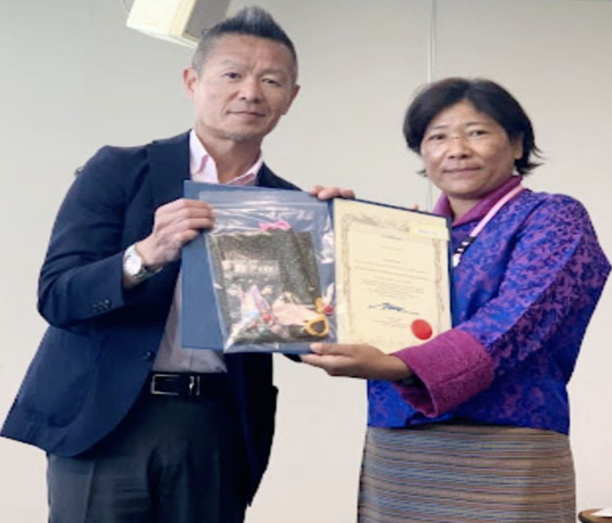
I am Yeshey Lham, a dedicated and goal-driven counselor at the National Commission for Women and Children (NCWC) in Bhutan. As a Head of the Protection Services, my main responsibility is to ensure the systematic and cohesive services to protect children and women in difficult circumstances including children in conflict with law. I have committed to provide appropriate interventions and safe facilitation to relevant agencies as per procedures outlined in the standard operating procedure for gender-based violence prevention and Child Protection, ensuring that the rights of women and children are protected and promoted through gender responsive interventions and children-sensitive perspectives.
Of late, I am attached with the Programme Division which functions to promote and protect the rights of women and children including strengthening of legal, policy, institutional and capacity building besides monitoring women and children protection services.
The National Commission for Women and Children in Bhutan works closely with Gender and Child Focal Points (GCFP) thus playing a key role in mainstreaming and addressing gender and child protection issues at the field level. Recognizing the need for adequate skills and knowledge for better service delivery, it is crucial that the expertise of the GCFPs is strengthened to respond to challenges related to women and children.
For this very purpose and to build further collaborations and partnerships, Japan International Cooperation Agency (JICA) and NCWC jointly organized a one-month capacity building programme targeting the GCFPs, NCWC officials and other relevant stakeholders on Protection and Care for Women and Children.
This training has helped me enhance my understanding of gender-based and domestic violence and its impact on the victims, therefore my efforts to work towards sustainable development in terms of inclusiveness has been boosted. It is also an added advantage to learn the best practices of the Japanese legal system, organizational structures that surround women and children.
JICA’s assignment of this training programme to Kitakyushu Forum on Asian Women (KFAW) has perfect training objectives that suited the Bhutanese context of work requirements. The training modules designed suited the needs of the participants. The training conducted in two batches was indeed a huge investment committed by JICA. Nonetheless, the participants have demonstrated their commitment in performing plans and programs in their respective community with the learning experiences gained and witnessed from Japan.
My recent task to roll out the workshops on implementing the RESPECT Framework to prevent violence against women, in collaboration with the UN in Bhutan, UNFPA, WHO, UNICEF and UNDP, was an enormous success. Through 3-day workshop in two batches, we were able to reach out to all 20 districts and 4 municipals, in equipping not only our GCFP but also key people from the districts with knowledge and guidance, promising practices and share links to resources and tools to facilitate scaling up of evidence-informed strategies to prevent violence against women. Each letter of RESPECT stands for one of seven strategies.
The experiences I gained in Japan made me confident to deliver my sessions during those training sessions.
The Module titled “Initiatives on Gender Equality and Kitakyushu City’s, Support System for Women and Children, Structure and Programmed on Protection on Women and Children support system for women and children in Kitakyushu city” are best suited for my targeted participants. The inclusion of Chairpersons of the Local Government, Officer in Commanding of the Royal Bhutan Police with GCFPs across the country has guided me to reflect on the Japan’s local government initiatives that are center of practical operations for women and children with an alertness on the importance of relevant legislations, regulations and efforts to prevent violence against women and children. The training in Japan helped me prepare my presentations effectively and facilitate the roll-out smoothly and confidently.
Similarly, the module on Initiatives to Prevent Child Abuse by Kitakyshu City and Offender Rehabilitation System coupled with other modules, have also helped me enhance my efforts in coordinating and supporting children in conflict with law as well as to emphasize on rehabilitation and safe reintegration to juvenile delinquents especially with girls experiencing more stigmatization. The enriching lessons have helped in presentation delivery on situations of children in the country to newly selected District Education Officers and school Principals in 2023 and Early Identification and Safe Referral Training to teachers and Health Workers recently.
Lastly, on behalf of NCWC, Royal Government of Bhutan, I convey my humble gratitude to the JICA Office for awarding me this opportunity and express my sincere appreciation to KFAW for organizing excellent training course.
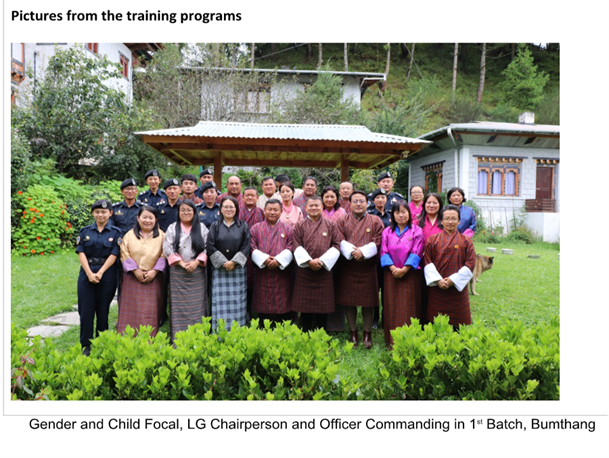
(REMARK)
NCWC (National Commission for Women and Children)
GCFP (Gender Child Focal Point)
UNFPA (United Nation Population Fund)
WHO (World Health Organization)
UNFPA (United Nation Population Fund)
UNDP (United Nations Development Programme)
Women’s issues in Bhutan
– lhaden wangmo
RENEW Project Manager
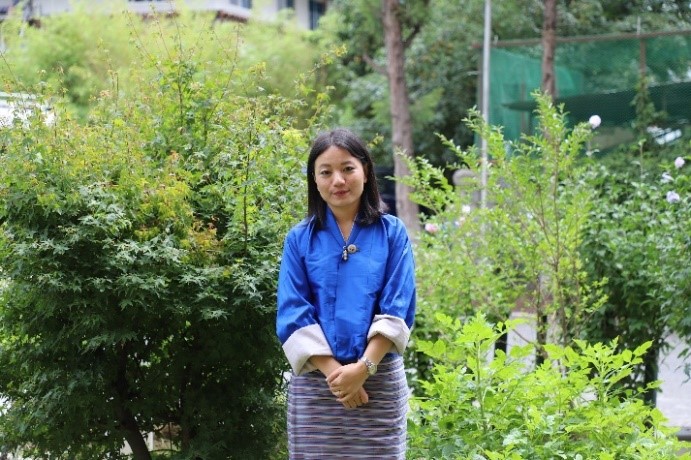
Bhutan has made progress in enacting laws and formulating policies and regulations on sexual and reproductive health, young people, and gender equality. Despite strong political commitment and a supportive legal and policy framework, Gender-based violence remains an issue in Bhutan. The country faces challenges in ensuring the implementation of the policies and laws.
Gender-based violence against women and girls is one of the most significant social issues today with widespread impacts, including on health and well-being, productivity, and national development. Prevent domestic violence and to provide the necessary support for the victims, the Domestic Violence Prevention Act of Bhutan was enacted in 2013. Since then, many initiatives have been taken by the National Commission for Women and Children (NCWC) as the “Competent Authority” in collaboration with Civil Society Organizations and relevant partners in implementing the Act.
I am working as a Project Manager in Respect, Educate, Nurture, Empower Women (RENEW) Organization, and prior to the present position, I also worked as Sr. Counsellor. It is my privilege to jot down a few of my personal reflections and what I have experienced working as a service provider to the women and girls in my country. Today whatever I share here is based on my personal experience and what I have observed on my ongoing services at RENEW Organization. I started working as an assistant counsellor from January 2012 till January 2023. I have personally seen and provided services to more than a thousand survivors of Domestic violence and Gender-based violence for many girls and women.
RENEW is a civil society organization (CSO) established by Her Majesty the Queen Mother Gyalyum Sangay Choden Wangchuck to empower families affected by domestic violence and Gender-Based Violence, with a special focus on vulnerable women and children. RENEW is the first and only CSO of its kind in Bhutan. RENEW initiated several services such as individual, couple, and family counselling, legal aid, livelihood skills training, safe house, medical aid, educational scholarship, case management services, and SRH clinic.
RENEW works tirelessly to raise awareness about the prevalence and consequences of such violence, provide support services to survivors, and advocate for policy changes and legal reforms. Due to the RENEW Organization’s tireless work on raising awareness and sensitization at the community level, the major outcome it has led to is the increased knowledge and understanding of the various forms of gender-based violence, its impact on women’s lives, and the importance of getting the right services needed. The people and the communities around them have also gained a deeper understanding of the underlying causes and dynamics of violence against women and girls.
RENEW also conducts training and capacity-building programs for the volunteers, stakeholders, and our partners across the country to cater the services to every corner of places in Bhutan. RENEW has successfully established 10 Community Service Centres in ten districts to provide services to those in need in the community.
In 2021 alone we have provided services to 774 cases of DV/GBV by platforms such as social media, Walk-in clients, helpline, and referrals from our volunteers across the country. When it comes to the cases we handle, we provide services to all ranges of different situations, including various forms of abuse such as Economic abuse, physical abuse, Sexual abuse, Emotional abuse, and Non/DV/GBV. Most Bhutanese women stay in abusive relationships because they are dependent on their spouses economically, fear and safety concerns, lack of support system, emotional attachment and love, and cultural and religious factors.
During my tenure, I have come across many women and girls who availed our services and made positive changes in their lives such as emotional healing and empowerment, access to legal support, financial independence, building support networks, and breaking the cycle of abuse. I feel like it is important to know that services may vary from individual to individual and not all the survivors will experience the same positive changes. However, the support and services provided by RENEW were instrumental in helping women rebuild their lives and move towards a brighter future.
The issues faced by women in Bhutan are complex and multi-faceted, requiring our attention and collective efforts to bring about positive change. It is evident that despite progress being made in recent years, there is still much work to be done to achieve gender equality in Bhutan. it is essential to approach
these issues with optimism and determination. Bhutan, as a nation known for its commitment to Gross National Happiness, has the potential to lead the way in promoting gender equality.
Additionally, it is imperative to engage all stakeholders, including government entities, civil society organizations, and individuals, in the conversation surrounding women’s issues.
By raising awareness, challenging stereotypes, and advocating for change, we can collectively create an environment where women can thrive and reach their full potential.
Thank you for reading. Any comments and suggestions are welcome.
Email us! →info@kfaw.or.jp


